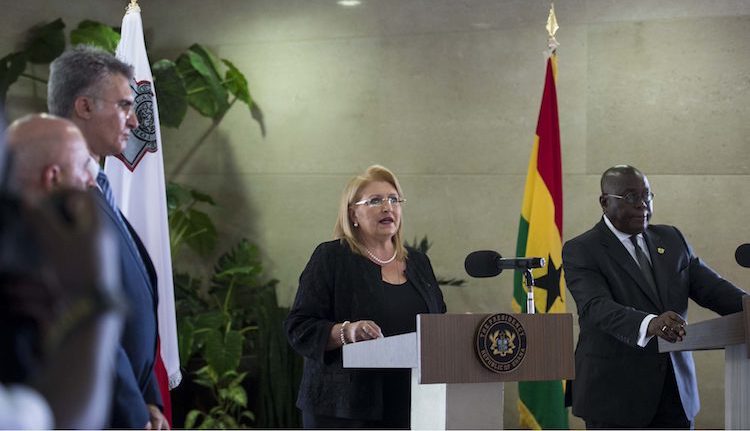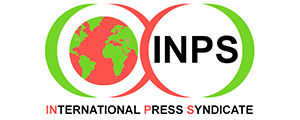
By Marie-Louise Coleiro Preca, President of Malta
Following are extensive extracts from the speech delivered by Marie-Louise Coleiro Preca, President of Malta, at the 17th session of the UNIDO General Conference ‘Partnering for Impact: Achieving the Sustainable Development Goals’ in Vienna on November 27, 2017. Li Yong was re-appointed for a second term (2017-2021) as the Director General of the Organization at the opening of the session. – The Editor
VIENNA (IDN) – Two years have passed since the adoption of the United Nations’ Agenda 2030. Its seventeen Sustainable Development Goals are still the main benchmark for the international community, to work for the aspirations of humanity, for effective global development in a holistic and an integrated way.
Agenda 2030 is still a powerful reminder of our collective responsibility to act for an inclusive and sustainable approach to the development of our planet.
Agenda 2030 proposes the need for synergies and interconnectedness between the Global North and the Global South, to ensure prosperity and wellbeing for all the inhabitants of our world.
Strategies for inclusive and sustainable industrial development, which are so fundamental to UNIDO‘s mission, also play a central role in order to succeed in implementing Agenda 2030.
This is particularly evident in Goal Number 9, which seeks to highlight resilient infrastructures, inclusive and sustainable industrialisation, and foster innovation. Fundamental to SDG 9, is the need of education and training, which is specified in SDG 4.
I am pleased to note that UNIDO is providing a context in which multilateral partnerships can take place, to achieve these targets, thanks to its extensive membership network, vast expertise in these areas, and tangible initiatives, such as the Roadmap for the Implementation of the Third Industrial Development Decade for Africa (2016 – 2025).
In this context, UNIDO’s priorities are strongly contributing towards the attainment of the SDGs, by focusing on the importance of creating shared prosperity through job creation, while safeguarding the environment.
I feel proud of UNIDO’s endeavours to achieve SDG 1, which underlines the need to eradicate poverty through an inclusive and sustainable approach. I believe that Sustainable Development Goals 4 and 9 are intrinsically linked together, to address and to achieve SDG 1.
Furthermore, I believe that this UNIDO general conference is taking place at a most appropriate time as it is happening on the eve of the EU-Africa Summit in Abidjan.
I hope that the EU Africa summit will take into consideration the deliberations of this General Assembly and in particular, what UNIDO is proposing in terms of the Roadmap for the implementation of the Third Industrial Development Decade for Africa.
I look forward to the prospect of further and better collaboration between the institutions, in particular at this time, when these two important meetings are taking place, to take the next step forward to address the challenges faced by the people of Africa.
I believe that it is of utmost importance that all initiatives, which are taken, will form part of one global holistic plan of action.
I would like to encourage the leaders at the EU-Africa Summit to keep to the framework established by the Agenda 2030, and also to develop an effective plan of action so as to ensure that the joint Africa-EU Strategy is successfully implemented.
Let me also take this opportunity to speak about Global Africa, which was launched in Malta during the ACP-EU Joint Parliamentary Assembly at the conclusion of the Maltese Presidency of the Council of the European Union, in June of 2017.
I am proud to be a patron of Global Africa, which is a new space for policy dialogue, cooperation, and exchange on topics of African social, political and economic development.
It aims to facilitate initiatives related to the African continent, and interactions with civil society, enterprise, cultural organisations, parliaments, and other entities, at the national, regional and international level.
Global Africa’s approach is to seek partnerships with a wide range of stakeholders, thereby promoting opportunities for employment, investment, knowledge, and skills in Africa.
One such initiative, which I would like to highlight today, is Global Africa’s proposal for the creation of the African School of Invention, which will be offering training schemes for enterprise, innovation, and creativity.
This proposal also corresponds well with UNIDO’s own plans, for job creation and industrialisation in Africa.
However, in order to achieve the full potential of Africa, I believe that the outlook of the international community, towards the African continent, has to be revisited.
Africa is an huge emergent market, with an astounding potential young workforce. By 2050, Africa’s population will reach 2.5 billion.
Africa needs and deserves proper sustainable investment and must be looked at as a strategic partner.
Africa has the necessary resources but needs effective and genuine partners to develop sustainably, to its full potential.
In this context, I would like to refer you to the Second Honest Accounts Report, an important document compiled by a coalition of UK and African NGOs. This report affirms that while African countries are rich, they are not the ones who are not reaping the full benefits of their own wealth.
The report continues to underline that whilst countries in Africa receive $162 billion in resources, such as aid, loans and foreign investment, a massive $203 billion is taken out, mostly by multinational corporations, debt payments, tax dodging, and the costs imposed by climate change, caused by the rest of the world.
This means that the rest of the world receives over $41 billion a year from African countries. Thus, much more wealth is leaving Africa than entering it. If ordinary Africans could benefit from this wealth, it would help provide education, clean water, housing, and healthcare.
Therefore, I believe that the very first and foremost investment that the international community should afford, is genuine investment in the dignity of the peoples of Africa.
Secondly, I believe that we must perceive Africa from an African vision and point of view, and not solely linked to third parties’ strategic interests.
Personally, I have been to a number of African countries, whereby I led business delegations and could experience, first hand, the urge of African businesses to find collaborations and strategic partnerships, to grow and prosper together.
I have also had personal experiences where civil society organisations impressed me with their tangible empowerment projects, aimed at the young people of Africa.
We must also encourage and tangibly support our respective civil societies, to engage and contribute towards the diverse communities in Africa.
Africa needs long-term commitment and sustainable investment. The international community must effectively help to develop Africa’s youth potential.
Let me now refer to some of the initiatives taking place in my own country, which reflect Malta’s commitment to the successful implementation of the United Nations’ Agenda 2030.
I am proud to say that during Malta’s Presidency of the Council of the European Union, development cooperation was on the top of Malta’s agenda, culminating in a new European Consensus for Development, which was adopted in May 2017. This consensus has effectively aligned all European development action with the United Nations’ Agenda for Sustainable Development.
Moreover, next year, Malta will deliver its first Voluntary National Review, at the 2018 UN High-Level Political Forum. This will be an important opportunity to take stock of my country’s efforts to implement the SDGs, and to report on our progress with our peers.
All of Malta’s sustainability endeavours are firmly rooted in the Sustainable Development Act, a legislative framework adopted by the Maltese Parliament in 2012, through which the government integrates sustainable development across its operations.
Many initiatives are being taken with the scope of raising awareness on sustainable development issues, in all strata and sectors of government and society.
Let us continue working together, within our respective nations and also on a regional and multilateral platform, in order to ensure that sustainability, especially through Agenda 2030 and the SDGs, continues to play a vital role. [IDN-InDepthNews – 27 November 2017]
Photo: Marie-Louise Coleiro Preca, President of Malta on a state visit to Ghana in July 2017. Credit: Malta President’s Website
IDN is the flagship agency of the International Press Syndicate
Facebook.com/IDN.GoingDeeper – twitter.com/InDepthNews

